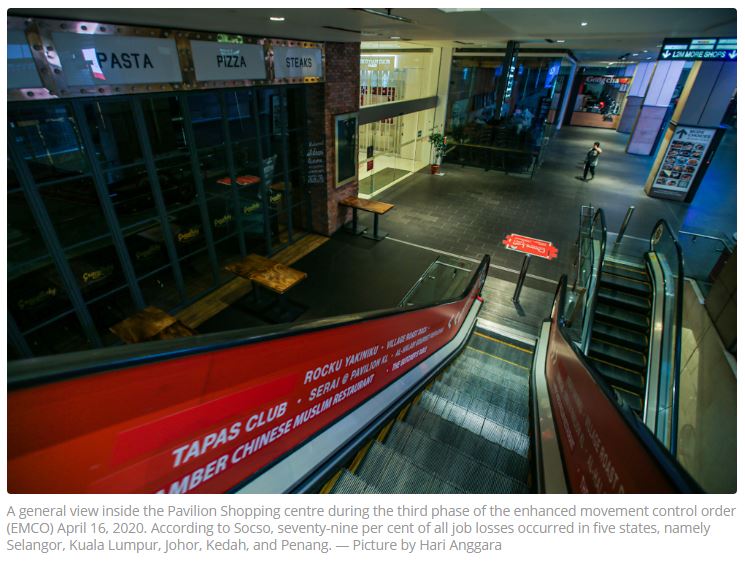Socso: Job losses in Malaysia increased by 42pc in Q1 due to Covid-19
KUALA LUMPUR, June 3 — Due to the Covid-19 pandemic, job losses in the country has increased by 42 per cent year-on-year for this first quarter (Q1 2020), according to the Social Security Organisation’s (Socso) Employment Insurance System (EIS).
In a report titled “Employment Outlook, the 1st Quarter of 2020, Volume 4/2020, The Impact of Covid-19 on Loss of Employment (LOE)”, EIS said the pandemic has impacted many businesses, to experience a drop in demand at 37 per cent or being unable to operate as usual at 42 per cent.
“This trend is only expected to accelerate from April 2020 onwards, with job losses increasing by 50 per cent to 200 per cent year-on-year for each subsequent quarter in 2020,” it said in the report published today.
In addition, the unemployment rate is forecast to hit four per cent in 2020 compared to 3.2 per cent during the 1997 Asian financial crisis and 3.7 per cent during the Great Recession in 2018.
Meanwhile, the retrenchment figures are expected to be similar to those during the 1997 Asian financial crisis due to pre-emptive measures of Employment Retention Programme (ERP) and Wage Subsidy Programme (PSU) taken by the government to prevent mass lay-offs.
“The youth unemployment rate has remained mostly steady at eight to 11 per cent. However, they are the age demographic most vulnerable to retrenchment.
“LOE data shows that 61 per cent of job losses are among workers aged 40 and below, with 31 to 40-year-olds accounting for 32 per cent and workers under 30 making up the rest at 29 per cent. Male workers are more likely to be retrenched than female counterparts at 60 per cent male to 40 per cent female, this may simply reflect the fact that there are more men than women in the workforce,” it said.
The report states, out of 7.5 million active employees registered with Socso in 2019, 1.458 million worked in a tourism-related sector, while 1.457 million worked in manufacturing.
“It should be no surprise then that over half of business closures occurred among large employers of over 200 workers in the tourism sector, while the manufacturing sector retrenched the most workers at 23 per cent of the total to reduce overhead costs after being forced to shut their factories,” it said.
Employers who have yet to retrench staff are embarking on cost-cutting measures nonetheless.
“One of the most popular methods is to reduce salary, especially for employees who have been employed for more than five years as their salaries are typically 45 per cent higher than those of shorter-tenured employees,” it said.
At 41 per cent, young employees aged 30 and below make up the majority of active employees registered with Socso, showing an increase of six per cent from 2018. Among them, 70 per cent have less than two years of working experience.
On the other hand, the report mentioned the proportion of workers aged 40 and above who are registered with Socso actually decreased by four per cent in 2019. Among this group, 84 per cent have served for more than two years at the same company.
Seventy-nine per cent of all job losses occurred in five states, namely (in order) Selangor, Kuala Lumpur, Johor, Kedah, and Penang.
“Selangor, the first-ranked state, accounted for 32 per cent of job losses. However, it should be noted that 30 per cent of all jobs are located in Selangor, representing an increase of six per cent from 2018.
“Of more concern is Kedah, which accounted for one in six job losses despite being home to a relatively small number of employers.
“Job losses in Johor were mostly in the manufacturing sector at 37 per cent and tourism-related industries at 36 per cent,” it said.
Moreover, the report said in most other states like Kelantan, Melaka, Negri Sembilan, Perak, Sabah, Selangor, Kuala Lumpur, and Labuan, job losses were concentrated in tourism-related industries while few states deviated from that trend, including Putrajaya (ICT), Sarawak (construction), Pahang (other unclassified sectors), and finally Kedah, Perlis, Penang, and Terengganu (all manufacturing).
“On average, each employer had 15 foreign workers for each retrenched employee. The ratio was even higher in large companies with more than 200 workers, which had 69 foreign workers for each retrenched employee,” it said.
Job losses by states and federal territories involving the construction, finance and insurance, ICT, manufacturing, professional and technical, tourism-related and others, recorded Selangor at 6,128, Kuala Lumpur (4,959), Johor (1,457), Kedah (1,297), Penang (1,296), Sabah (1,183), Sarawak (845), Perak (727), Pahang (428), Melaka (284), Kelantan (196), Terengganu (171), Negri Sembilan (159), Perlis (55), Labuan (38), and Putrajaya (17).
The report also mentioned that in an effort to prevent retrenchments, the government has allocated RM14.05 billion in funding to the ERP and PSU programmes in addition to enhancing Employment Insurance System (EIS) benefits.
PSU applications have indicated that 79 per cent of businesses were unable to operate during the movement control order (MCO) and faced declining sales as a result.
“About seven per cent of companies are unable to sustain themselves for over six months on current reserves if the outlook does not improve soon.
“More than 90 per cent of employers felt that their businesses were negatively impacted by the economic crisis linked to Covid-19. Among those, 93 per cent felt that the measures taken by the government were helping them to stay afloat,” the report read. — Bernama
Source: https://www.malaymail.com/news/malaysia/2020/06/03/socso-job-losses-in-malaysia-increase-by-42pc-in-q1-due-to-covid-19/1872211


 English
English




